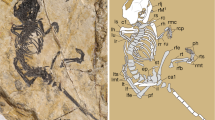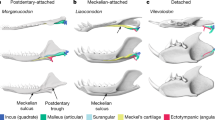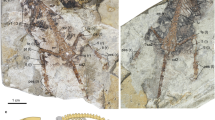Abstract
THE evolution of the middle ear is central to the discussion of how the first tetrapods adapted to life on land as well as their phylogeny1–3. Here I report the discovery of the stapes of Acanthostega gunnari, from the Upper Devonian of east Greenland. This is the earliest tetrapod stapes so far described, and it throws new light on both these aspects of early tetrapod biology. It has been assumed that the common inheritance of all early tetrapods was a light, rod-like stapes associated with a temporal notch in the otic region that was thought to have supported a tympanum, or eardrum. The stapes would have conducted vibrations from the tympanum to the otic capsule. By contrast, the stapes of Acanthostega was stout with a broad distal ramus associated with the temporal notch. I suggest that the temporal notch of Acanthostega and other early tetrapods supported a spiracular opening rather than a tympanum, and that the stapes controlled palatal and spiracular movements in ventilation.
This is a preview of subscription content, access via your institution
Access options
Subscribe to this journal
Receive 51 print issues and online access
$199.00 per year
only $3.90 per issue
Buy this article
- Purchase on Springer Link
- Instant access to full article PDF
Prices may be subject to local taxes which are calculated during checkout
Similar content being viewed by others
References
Watson, D. M. S. Proc. zool. Soc. Lond. B 1917, 167–186 (1917).
Panchen, A. L. in Studies in Vertebrate Evolution (eds Joysey, K. A. & Kemp, T. S.) 65–68 (Oliver and Boyd, Edinburgh, 1972).
Bolt, J. R. & Lombard, R. E. Biol. J. Linn. Soc. 24, 83–99 (1985).
Panchen, A. L. Nature 333, 704 (1988).
Smithson, T. R. Zool. J. Linn. Soc. 76, 29–90 (1982).
Clack, J. A. Zool. J. Linn. Soc. 79, 121–148 (1983).
Carroll, R. L. in The Terrestrial Environment and the Origin of Land Vertebrates (ed. Panchen, A. L.) Syst. Ass. Spec. Vol. 15, 293–317 (Academic, London, 1980).
Jaslow, A. P., Hetherington, T. E. & Lombard, R. E. in The Evolution of the Amphibian Auditory System (ed. Fritzsch, B.) 69–91 (Wiley, New York, 1988).
Clack, J. A. Phil. Trans. R. Soc. B 318, 1–107 (1987).
Clack, J. A. Palaeontology 31, 699–724 (1988).
Randall, D. J., Burggren, W. W., Farrell, A. P. & Haswell, M. S. The Evolution of Air-breathing in Vertebrates (Cambridge University Press, 1981).
Allis, E. P. J. Anat. 56, 189–294 (1922).
Panchen, A. L. Phil. Trans. R. Soc. B 263, 279–326 (1972).
Carroll, R. L. in Panchen A. L. Phil. Trans. R. Soc. B 309, 461–568 (1985).
Panchen, A. L. Phil. Trans. R. Soc. B 309, 461–568 (1985).
Smithson, T. R. Zool. J. Linn. Soc. 85, 317–410 (1985).
Lombard, R. E. & Bolt, J. R. in The Evolution of the Amphibian Auditory System (ed. Fritzch, B.) 37–67 (Wiley, New York, 1988).
Author information
Authors and Affiliations
Rights and permissions
About this article
Cite this article
Clack, J. Discovery of the earliest-known tetrapod stapes. Nature 342, 425–427 (1989). https://doi.org/10.1038/342425a0
Received:
Accepted:
Published:
Issue Date:
DOI: https://doi.org/10.1038/342425a0
This article is cited by
-
Morphology of the earliest reconstructable tetrapod Parmastega aelidae
Nature (2019)
-
The Fish–Tetrapod Transition: New Fossils and Interpretations
Evolution: Education and Outreach (2009)
-
The cranial endoskeleton of Tiktaalik roseae
Nature (2008)
-
A Devonian tetrapod-like fish and the evolution of the tetrapod body plan
Nature (2006)
-
Tetrapod-like middle ear architecture in a Devonian fish
Nature (2006)
Comments
By submitting a comment you agree to abide by our Terms and Community Guidelines. If you find something abusive or that does not comply with our terms or guidelines please flag it as inappropriate.



